Strauss-Kahn: What went right and wrong?
- Published
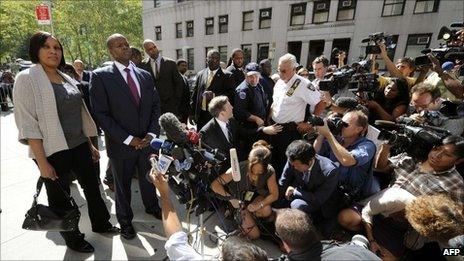
Nafissatou Diallo's credibility has been picked apart in recent weeks
Now that the charges against Dominique Strauss-Kahn have been dropped, expect the blame game to begin in earnest. But the BBC's Laura Trevelyan in New York says some legal analysts believe the case showed the system worked as it should have.
"How could District Attorney Cyrus Vance have got it so wrong?" the critics will ask.
Mr Strauss-Kahn's allies will doubtless claim that the now infamous shot of him doing the perp walk in handcuffs outside a New York police station cost him his job as IMF director and the chance to stand for president of France.
And yet, a number of legal experts believe that the saga of Nafissatou Diallo versus Dominique Strauss-Kahn shows the system working as it should when faced with the serious accusation of sexual assault.
After all, police did find forensic evidence of a sexual encounter of some kind between the hotel maid and the global financier.
Diametrically opposed backgrounds
It was a case of "she said, he said", where investigators and the prosecution had to unravel the competing accounts.
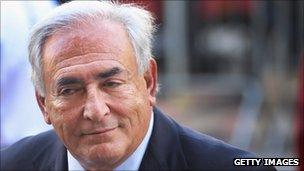
The case cost Dominique Strauss-Kahn his job and possibly the chance to stand for president of France
James Cohen, a professor of law at Fordham University, predicts the prosecution will be accused of failing to investigate properly, bringing down an innocent man in the process.
But he says the district attorney's office acted appropriately.
"The system is supposed to get it right and it did get it right," he said.
"There was a charge made and no reason not to accept it.
"The defence raised the consensual sexual encounter issue, the [district attorney] investigated the background of the victim and found she had credibility issues.
"So it's not a perfect process, but it worked as it's supposed to."
Much has been made of the diametrically opposed backgrounds of Ms Diallo, a hotel maid from Guinea, bringing up her daughter in the Bronx borough of New York, and Mr Strauss-Kahn, the poised, wealthy politician and financier.
The unravelling
Yet after the clash of those two worlds in Manhattan's Sofitel Hotel on 14 May, Ms Diallo's claims of sexual assault were not ignored, even though her lawyer now says the former IMF dierctor's wealth and power intimidated the prosecution into dropping the charges.
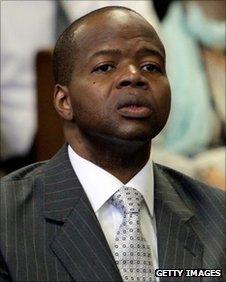
Ms Diallo's lawyer Kenneth Thompson says she has been denied justice
Police acted quickly to arrest Mr Strauss-Kahn just hours after the alleged encounter - but they would not have acted in such haste had he not been on a plane bound for France, says Linda Fairstein, the former head of the sex crimes unit in the Manhattan district attorney's office.
"The French are our friends and allies; it shocked me that we had no extradition agreement with them on sexual cases," she said. "Remember Roman Polanski never came back. There was that history."
Then there was Mr Strauss-Kahn's history as a womaniser to consider.
"Mr Strauss-Kahn's reputation of someone who's sexually aggressive with women seemed consistent with someone who could do this," Prof Cohen said.
Once the police had arrested Mr Strauss-Kahn, he was held in the infamous Ryker's Island jail, notorious for gang violence.
The dishevelled, fraught-looking Mr Strauss-Kahn was paraded in front of the cameras, handcuffed, a move New York authorities defended as standard practice.
Based on prosecutors' argument that the former jet-setting IMF boss was a flight risk, the judge set stringent bail conditions, placing Mr Strauss-Kahn under house arrest with an armed guard.
He and his wife rented a townhouse in lower Manhattan after their original plan to move to a posh apartment block on the Upper East Side fell afoul of neighbours horrified by the hordes of camera crews.
'Damning information'
Then, in late June the case began to unravel. The prosecution informed the defence of Ms Diallo's credibility issues - the results of its internal investigation.
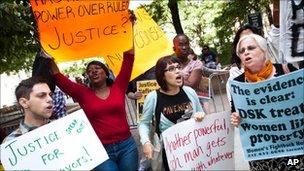
Protesters chanted slogans and waved placards outside the court
Ms Diallo had lied on her asylum application and tax forms, prosecutors said, and changed her account of what happened immediately after the alleged attack in the hotel room.
US media reported that Ms Diallo had spoken to a man in jail about the possible benefits of bringing a case against Mr Strauss Kahn - her lawyers say the conversation in the Fulani language of Guinea was mistranslated.
Subsequently, Mr Strauss-Kahn's bail conditions were lifted.
So how did that happen?
Given that the entire prosecution case would depend on a jury believing Ms Diallo's version of events, her credibility was key.
A feeble, evasive witness would never withstand cross-examination by Mr Strauss-Kahn's crack legal team.
The problems arose when prosecutors began looking at Ms Diallo's background.
"You start to get records from the banks, from the authorities," said Ms Fairstein, the former sex crimes prosecutor.
"You're doing this to support her at the trial. And instead of getting what you expect, you're getting inconsistency."
'Power inequity'
Mr Kluger said that what fatally damaged Ms Diallo's credibility was a recorded phone call in which she appeared to discuss the financial benefits of pursuing a case against Mr Strauss-Kahn with her fiance, who was imprisoned on drug charges.
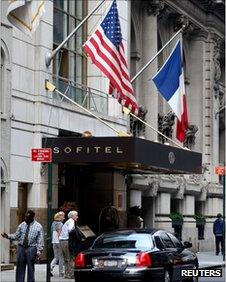
We may never know what happened in the luxury suite at the Sofitel hotel
"The fact that the witness may have some skeletons in her cupboard isn't necessarily unusual," he said.
"It was the fact that there seemed to be a motive - that was the most damning piece of information.
"The credibility of the victim is the most important thing and the [district attorney] has to make a judgment. It's embarrassing for them to have so misjudged."
Although Prof Cohen believes the legal system worked as it's designed to, he notes the case yielded "very unfortunate consequences".
"He lost the managing directorship of the IMF and might have lost the opportunity to be president of France," he said.
Ms Fairstein fears the publicity surrounding the case could prove a setback for legitimate victims of sexual assault.
"If people dismiss the maid and say she did it for the money, it will have a chilling effect on some rape victims," she said.
But Mr Kluger said the case, from start to finish, showed everyone is equal in the eyes of the law.
"Her allegations were taken seriously despite the power inequity between them," he said.
"A system where the prosecutor brings charges, rather than make backroom deals or sweep things under the carpet, and then says I have questions about the case - that's how it's supposed to work."